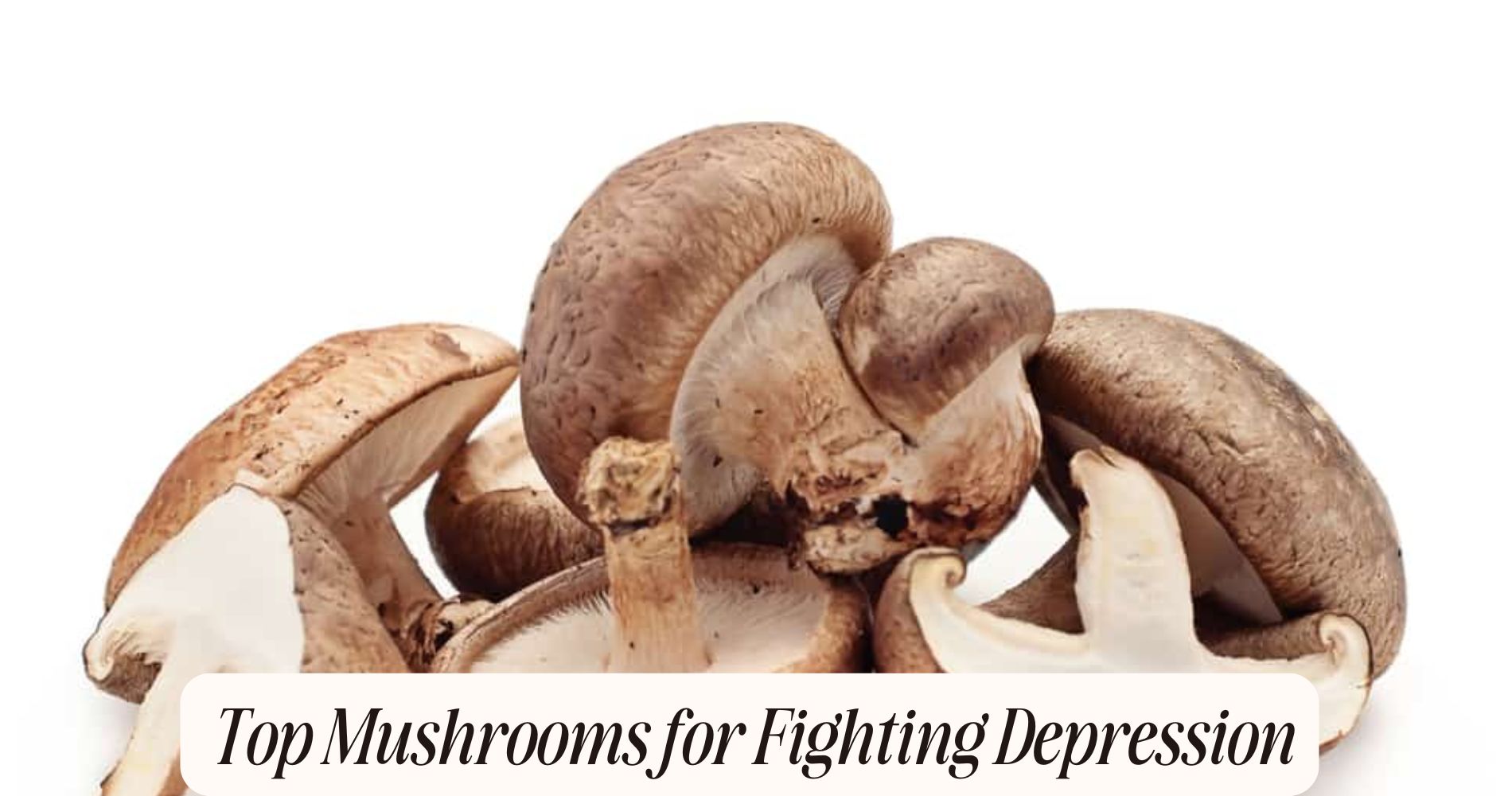
Best Mushrooms for Managing Diabetes Naturally
When searching for the best mushrooms for diabetes management, consider adding reishi, shiitake, and maitake to your diet. Reishi can help reduce blood sugar levels, while shiitake supports glucose regulation with its low glycemic index. Maitake enhances insulin sensitivity, making it an excellent dietary choice. Chaga and lion’s mane promote metabolic health, while cordyceps improves insulin response. Turkey tail mushrooms support gut health, which plays a crucial role in blood sugar control. Each of these mushrooms offers unique advantages, helping you find the best fit for your lifestyle. Exploring these options can enhance your diabetes management plan naturally and effectively.
Reishi Mushrooms
Reishi mushrooms, often referred to as the "mushroom of immortality," have gained attention for their potential benefits in managing diabetes. These fungi contain bioactive compounds that may help regulate blood sugar levels and improve insulin sensitivity. Research suggests that reishi mushrooms can lower fasting blood glucose levels, making them a valuable addition to your diabetes management strategy.
To harness the reishi benefits, you might consider incorporating them into your daily routine. You can find reishi in various forms, such as capsules, powders, or teas.

However, it's important to pay attention to the reishi dosage. Most studies recommend a daily intake ranging from 1 to 3 grams of dried reishi extract, but starting with a lower dose and gradually increasing it's wise to see how your body responds.
As with any supplement, it's vital to consult with your healthcare provider before adding reishi mushrooms to your regimen. They can help guarantee it aligns with your overall treatment plan and monitor any potential interactions with your current medications.
Shiitake Mushrooms
Shiitake mushrooms offer impressive nutritional benefits that can support your overall health, especially if you're managing diabetes.
Rich in essential vitamins, minerals, and antioxidants, these mushrooms may also aid in blood sugar regulation.
Incorporating shiitake into your diet could be a delicious way to enhance your wellness journey.
Nutritional Benefits Overview
When considering your dietary choices, incorporating shiitake mushrooms can greatly enhance your nutrition. These mushrooms aren't just a flavorful addition to your meals; they're packed with essential health nutrients that support overall well-being. Shiitake mushrooms belong to a diverse group of mushroom varieties known for their unique flavor and health benefits.
Rich in polysaccharides, shiitake mushrooms help boost your immune system, which is essential for maintaining health. They're also an excellent source of B vitamins, including B2 (riboflavin) and B5 (pantothenic acid), which aid in energy metabolism.
Moreover, shiitake mushrooms contain vitamin D, especially when exposed to sunlight, supporting bone health and immune function. Additionally, you'll find important minerals like copper and selenium in shiitake, both of which play a significant role in various bodily functions, including antioxidant activity and the formation of red blood cells.
With low calories and high fiber, shiitake mushrooms can help you feel full and satisfied, making them a smart choice for weight management. By including shiitake mushrooms in your diet, you're not just savoring their taste but also reaping numerous nutritional benefits.
Blood Sugar Regulation Effects
Mushrooms, particularly shiitake, offer promising benefits for blood sugar regulation, making them a valuable addition to a diabetes management plan. Rich in nutrients and low in calories, shiitake mushrooms have a low glycemic index, which means they won't spike your blood sugar levels after consumption. This characteristic is essential for maintaining stable glucose levels throughout the day.
Research suggests that shiitake mushrooms can enhance insulin sensitivity, allowing your body to use insulin more effectively. Improved insulin sensitivity can lead to better control of blood sugar levels, reducing the risk of complications associated with diabetes.
Moreover, the presence of bioactive compounds in shiitake, such as polysaccharides, may contribute to their anti-diabetic effects by promoting healthy glucose metabolism.

Incorporating shiitake mushrooms into your meals can be simple and delicious. You can add them to stir-fries, soups, or even salads.
As you explore their benefits, remember that they work best as part of a holistic approach to diabetes management, which includes a balanced diet, regular exercise, and monitoring your blood sugar levels.
With shiitake mushrooms, you're not just eating well; you're actively supporting your health.
Maitake Mushrooms
Among the diverse array of fungi, maitake mushrooms stand out for their potential benefits in managing diabetes. These unique mushrooms, also known as "Hen of the Woods," contain compounds that may help regulate blood sugar levels. Research suggests that maitake can enhance insulin sensitivity and lower blood glucose levels, making it a promising addition to your diet.
Incorporating maitake into your meals isn't just healthy; it's delicious too. You can sauté maitake mushrooms with garlic and olive oil for a savory side dish or add them to soups and stir-fries for added flavor and nutrition. You might even try them in omelets or as a pizza topping, creating tasty maitake recipes that fit seamlessly into your lifestyle.
Maitake benefits extend beyond blood sugar management. They're rich in vitamins, minerals, and antioxidants, which support overall health.
This holistic approach to diabetes management emphasizes the importance of a balanced diet, and including maitake can be a simple yet effective strategy. So, explore the culinary versatility of maitake mushrooms and enjoy the health benefits they bring to your table!
Chaga Mushrooms
Rich in antioxidants and essential nutrients, chaga mushrooms have gained attention for their potential role in managing diabetes. These unique fungi, often found growing on birch trees, are celebrated for their ability to support healthy blood sugar levels. Research suggests that chaga mushrooms can enhance insulin sensitivity, which is vital for effective glucose metabolism.
One popular way to enjoy the benefits of chaga is through chaga tea. This herbal infusion not only provides a warm, comforting beverage but also delivers a concentrated dose of the mushroom's beneficial compounds. Drinking chaga tea regularly may help regulate blood sugar levels and reduce inflammation, further supporting your overall health.

Another effective method of incorporating chaga into your routine is through chaga extract. This concentrated form allows for easier consumption and higher potency, making it a convenient option for those looking to manage their diabetes naturally.
Whether you choose tea or extract, you can harness the power of chaga mushrooms to support your body's needs.
Incorporating chaga into your diet can be a holistic approach to managing diabetes, promoting not just better blood sugar control but overall well-being.
Lion's Mane Mushrooms
Lion's Mane mushrooms are gaining attention for their potential health benefits, particularly in managing diabetes.
Research suggests that they may help regulate blood sugar levels and support overall metabolic health.
You can easily incorporate them into your diet through supplements or as a flavorful addition to various dishes.
Health Benefits Overview
Many people may not realize the significant health benefits of Lion's Mane mushrooms, particularly when it comes to managing diabetes. This unique mushroom variety is packed with bioactive compounds that can support overall health. Research suggests that Lion's Mane may enhance cognitive function, which is essential for anyone dealing with the mental strain of diabetes management.
Moreover, Lion's Mane mushrooms are rich in antioxidants, which help combat oxidative stress—a common issue for those with diabetes. These antioxidants can promote cellular health and may reduce inflammation, a contributing factor to diabetes complications.
Additionally, incorporating Lion's Mane into your diet can potentially improve gut health, which plays a key role in regulating blood sugar levels. A healthy gut microbiome can enhance nutrient absorption and support metabolic health, further aiding diabetes management.
Blood Sugar Regulation
Understanding blood sugar regulation is essential for effective diabetes management, and Lion's Mane mushrooms have shown promising potential in this area. Research indicates that these mushrooms may help improve insulin sensitivity, which is vital for maintaining stable blood sugar levels. By enhancing how your body responds to insulin, Lion's Mane could support your overall glycemic control.
Additionally, Lion's Mane mushrooms have a low glycemic index, making them a favorable choice for those looking to manage their blood sugar levels. Foods with a low glycemic index release glucose slowly into the bloodstream, helping to avoid spikes and crashes that can complicate diabetes management.
Incorporating Lion's Mane into your routine may aid in regulating blood sugar, thanks to its unique composition. The bioactive compounds found in these mushrooms, such as hericenones and erinacines, have been associated with neuroprotective effects and could further contribute to metabolic health.
Incorporating Into Diet
Incorporating Lion's Mane mushrooms into your diet can be a straightforward and beneficial way to support blood sugar management. These unique mushrooms contain compounds that may help regulate glucose levels and improve insulin sensitivity, making them a valuable addition to your meals.
To maximize the benefits, try integrating Lion's Mane into your weekly meal plan. You can sauté them with garlic and olive oil as a delicious side dish or add them to stir-fries for extra flavor and nutrition.

Consider experimenting with mushroom recipes like Lion's Mane tacos or soups, which allow the mushroom's texture and taste to shine.
As you incorporate Lion's Mane, keep these dietary tips in mind: start with small portions to observe how your body reacts, and pair them with other low-glycemic ingredients, like leafy greens and whole grains, to enhance their blood sugar-friendly effects.
Additionally, consider using powdered Lion's Mane in smoothies or oatmeal for an easy nutrient boost.
Cordyceps Mushrooms
The unique properties of Cordyceps mushrooms make them a fascinating option for managing diabetes. These fungi have been traditionally used in Chinese medicine, and recent studies support their potential benefits for blood sugar regulation. Cordyceps can enhance insulin sensitivity and improve glucose metabolism, which are vital for maintaining stable blood sugar levels.
When considering cordyceps benefits, you'll find that they also contain antioxidants that combat oxidative stress—an important factor in diabetes management. By reducing inflammation and improving overall energy levels, Cordyceps can help you feel more balanced and healthier.

For effective results, it's important to pay attention to cordyceps dosage. Research suggests that a daily intake of 1,000 to 3,000 mg can be beneficial, but it's wise to consult with a healthcare professional before starting any new supplement. They can help tailor the dosage to your specific needs.
Incorporating Cordyceps into your routine may not only support your diabetes management but also enhance your overall wellness. Whether through capsules, powders, or even teas, these mushrooms can be a valuable addition to your holistic approach to health.
Turkey Tail Mushrooms
Turkey Tail mushrooms are gaining attention for their potential role in managing diabetes. These vibrant fungi, scientifically known as Trametes versicolor, are rich in polysaccharopeptides, which have been shown to enhance immune support. This is critical for individuals with diabetes, as a robust immune system helps combat infections and manage inflammation.
Research indicates that Turkey Tail can improve gut health by promoting beneficial bacteria, which is fundamental for metabolic health. A healthy gut microbiome can influence insulin sensitivity and blood sugar levels, making Turkey Tail a valuable addition to your diet.
Furthermore, some studies suggest that the antioxidants in Turkey Tail may lower oxidative stress, a contributor to diabetes complications.
Incorporating Turkey Tail into your routine can be simple. You can enjoy it as a tea, in powdered form, or through supplements. However, it's important to consult with a healthcare professional before adding any new supplement to your regimen, especially if you have diabetes or other health concerns.
Frequently Asked Questions
Can Mushrooms Be Consumed Raw for Health Benefits?
Yes, you can consume certain safe mushroom varieties raw for health benefits. Raw mushrooms offer nutrients and antioxidants, but guarantee you choose varieties like champignon or enoki for ideal safety and nutrition. Enjoy them wisely!
Are There Any Side Effects From Eating Mushrooms Daily?
Eating various mushroom varieties daily can offer health benefits, but be cautious. Some individuals may experience digestive issues or allergic reactions. It's wise to consult a healthcare professional if you're considering daily consumption for long-term health.
How Do Cooking Methods Affect Mushroom Nutrients?
Cooking techniques notably impact nutrient retention in mushrooms. Steaming or sautéing preserves more vitamins compared to boiling. You should aim for methods that minimize water exposure, ensuring you get the maximum nutritional benefits from your mushrooms.
Can Mushrooms Interact With Diabetes Medications?
Yes, certain mushroom types can interact with diabetes medications. For instance, shiitake and reishi may enhance insulin sensitivity, providing diabetes benefits. Always consult your healthcare provider before adding mushrooms to your regimen to guarantee safety and effectiveness.
What Is the Best Way to Store Mushrooms?
To store mushrooms effectively, use proper mushroom storage techniques. Keep them in a paper bag or breathable container in the fridge. These ideal storage conditions help maintain freshness and prevent moisture buildup, extending their shelf life.
Conclusion
Incorporating mushrooms like Reishi, Shiitake, and Maitake into your diet can be a natural way to help manage diabetes. These fungi offer potential benefits such as improved insulin sensitivity and blood sugar regulation, all while providing essential nutrients. By embracing these powerful mushrooms, you're not just adding variety to your meals; you're also taking a proactive step toward better health. Remember, consulting with a healthcare professional is vital to tailor these options to your individual needs.




